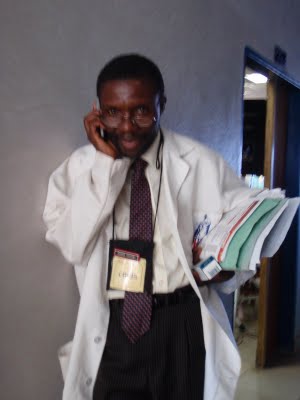By Mark Ellis

Since 2001 violent clashes between Muslims and Christians in Jos, Nigeria have scarred and further segregated two disparate population groups. But that hasn’t stopped one Christian doctor and his wife from bringing Jesus’ healing touch to the poorest of the poor – whether Christian or Muslim.
Chris Isichei came to Christ in his last year of high school after his sister invited him to a screening of a Christian film about the prodigal son. As he stood outdoors in the field where the projector and screen were set up, he felt God impress upon his heart, “This is your life.”
Like the prodigal who ran to his father in the open field, Chris rushed forward at the altar call to make a declaration of his faith. He says the pubic nature of the commitment – before other family members and friends — helps him in times of personal weakness.
As he grew in Christ, the Lord imparted a gift of mercy and compassion. “I began to think about being a doctor and using my skills to help people,” he says.
Chris attended medical school and began practicing medicine and lecturing at Jos University Teaching Hospital as a pathologist.
On a 1996 visit to the U.S, he witnessed the dramatic differences in health care available in the U.S. He decided that when he returned home, he would do everything he could to improve health care for his people, especially the poor.
A friend offered part of a hotel to set up a small treatment center, and Faith Alive Clinic was born. Initially the clinic had limited hours. It was staffed by Chris and a few volunteer doctors, nurses, counselors and medical students. They had little in the way of equipment or medications, but God’s compassion flowed freely.
Chris’ wife, Mercy, is a surgeon and works closely with him.
In 2006, Bayside Covenant Church in Granite Bay, California, donated the funds to build a three-story modern hospital in Jos. “It was a gift and a miracle from God,” Chris says.
They offer free medical services at Faith Alive, seeing 300 to 400 patients every day. About 60% of their patients are Christians and 40% are Muslims. Almost the entire medical staff works on a volunteer basis.
According to World Factbook, Nigeria has the second highest number of people living with HIV/AIDS. “Today, 90% of the patients we see are HIV positive,” Chris notes. While the government says there are 4.0 million living with HIV/AIDS, he believes the number is higher.
“It’s a political figure, because the government doesn’t want to discourage investment,” he says. “Every day we see 10 new cases.”
Chris credits former President Bush for making HIV/AIDS medications freely available throughout Africa. More than 4500 people are currently receiving these meds through Faith Alive Hospital.
“There is also a social and spiritual aspect to our mission,” Chris says. Patients are offered training in sewing, knitting, computers, driving, and kitchen services, among other skills.
A discipleship program is woven into the skills training, with about 100 graduating from the program each quarter. “You are not a Christian completely until you begin to disciple others and begin to reproduce your own kind,” Chris notes.
Faith Alive also has a free school with a Christian curriculum. “Those who can’t afford school elsewhere go to our school,” he says.
Every morning and evening the medical staff and patients take part in a devotional at the hospital. The Gospel message is presented at each gathering, with an opportunity to respond. “Every time we preach the Gospel there should be a verdict,” he believes.
“When patients are released, if they have no place to go, they stay in our transitional housing.”
Due to the violence in Jos that began in 2001, some have been discouraged from volunteering or even visiting the hospital from other countries. “We are reassuring them that we need their services and there are measures on the ground to stem the violence,” he notes.
Christian churches in Jos have barriers in place to ward off car bomb attacks. Metal detectors check congregants who enter churches. No one may carry a purse or bag into a church service. Similar measures have been established at the hospital.
The violence has led to greater segregation between Muslims and Christians, but not at the hospital.
“As Christians, we use health and social services to reach the poor. Most importantly, we present the Gospel to them.”
Learn more about Dr. Chris Isichei’s mission at www.faithalivenigeria.org




Great article! Thanks for spreading the good news of great ministry at Faith Alive in Jos, Nigeria. I’ve highlighted your post on my blog: http://notesfromnigeria-erika.blogspot.com.
Comments are closed.